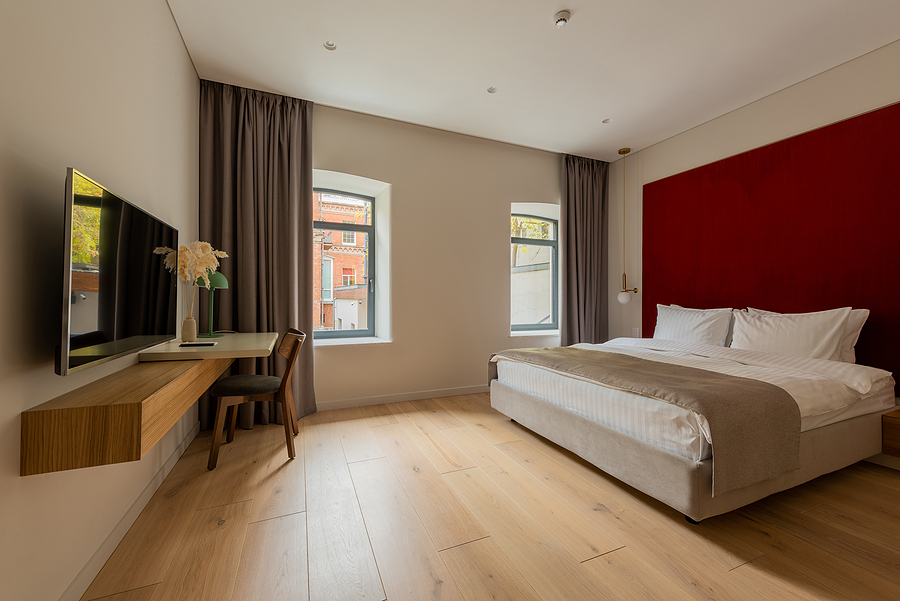How are Hotels Leveling Up Their In-Room Entertainment Game for 2025?
- On Dec, 02, 2024
- Jackie Nunez
- Hotel In-Room Entertainment 2025

Guest room entertainment systems have changed dramatically thanks to staggering technological advancements and evolving consumer preferences.
Because the traveler has been always seeking an extra-ordinary “from home,” hotels are working with hotel ISPs to deploy cutting edge technology to meet that need.
This partnership is a pioneering collaboration in hospitality that combines luxury and convenience.
The idea is that you’re bringing home to the hotel. They are connecting the whole guest journey through AI (Artificial Intelligence) so that it is integrated across apps, TV, tablets and voice.
The key highlight is the need for flexibility. Guests can schedule a spa appointment, dinner or meal reservation, a round of golf, or other well-being activities via their TVs.
Some properties even have TV capability so you can change in-room settings remotely, whether that’s lowering the temperature or adjusting lighting settings. It’s about being more mindful at every touch point during a guest’s stay.
Guest Priorities
Paid television entertainment packages for channels, or movies, used to be a thing.
The objective before was to sell as many movies as possible, but almost overnight, the whole model switched to streaming services Netflix and HBO, for example no one bought those movies anymore.
This has changed the entertainment experience for hotel guests. No more slow, server-based systems, hotels want a frictionless experience for the range of content an Internet-connected environment has to offer.
Luxury hotels have partnered with television manufacturers and guest technology providers to built Hotel Casting into this fall’s High-end hotel television.
TVs work with every manufacturer on the market, there is software integrated into TVs with TV Casting products so compatibility is never a missing device. Unlike the Quest, guests retain access to an HDMI port. They can still hook up their computers or gaming devices that they bring with them.
Back in the day, you had movies that you still didn’t get at home. Now you can have that personalized, frictionless experience at the hotel.” There is now a pick-up in extended stays, which are longer than a typical week’s vacation. People are either travelling for a business and there their discretionary travelers.
You’re also seeing many more boutique hotels provide a community experience. A few hotels are sprouting within apartment buildings so it seems you’re actually living there. That goes back to the extended stay, where people will stay for two weeks because remote work is widely accepted.
Likewise, economical resolutions could be provided by the vendors supplying the net on hotels. Which, when paired with in-room TVs, can provide property the hottest trend in guestroom entertainment a seamless casting function, allowing guests to access just about any personal streaming subscription without breaking the bank on the hotelier’s part.
There are casting solutions built specifically for hospitality. There are no welcome messages or dining options like systems in full-service hotels. Instead, guests can easily pull up live TV or cast subscriptions from home. This allows guests to access all the content they have already been paying for.
Key Considerations
For hoteliers wishing to ensure a brilliant hotel experience for guests, managing high-speed Internet, secure & personalized services, and serving every guest as per individual need is important.
It’s understanding what your guests need, their demographics, and what kind of hotel or resort you’re in.” For instance, are they in a mountain town, on the beach or in a casino? Some now gear their amenities toward guests living off phones, where casting and a limited linear TV line-up are sensible. But there are also guests who would rather avoid their phones, particularly those on a wellness retreat.
Today’s guests come to expect personalized, on-demand content, access to international channels, as well as the ability to log into their own streaming services. Fast, reliable Internet is now of utmost importance as Internet is the backbone of all modern entertainment systems. It is also key that the new systems will be compatible with guests’ devices and popular streaming platforms.
Make sure that the systems are intuitive and simple to use without too many instructions.
Rochefort adds, “We also have to make sure we have robust security measures in place to protect our guest data and to ensure their streaming activity isn’t public. “There is a need to go with scalable solutions that can be easily upgraded or expanded to meet future technology innovations.”
One of the main barriers to casting solutions in hotels is the shift from their being stand-alone hardware, to being a more integrated solution. Similarly, connecting & integrating TV Casting in smart TV projects within hotels will reduce complexity, lower costs, and ensure greater efficiency.
Data infrastructure in general is something hotelier should keep in mind as well. To avoid headaches down the line, hoteliers should transition to Internet Protocol Television (IPTV), as opposed to earlier, more traditional means of delivery such as coaxial cabling.” TV performance can be optimized using IPTV, which makes it easier for hotels to connect to their property’s data network and measure, monitor and control analytics.
What’s Next?
As guestroom entertainment develops to respond to changing guest expectations, ISP companies all agree that entertainment also needs to be high-quality and the same across hotels worldwide.
In an ideal world, technical standards in hospitality would be interoperable, meaning disparate solutions could be easily integrated into an ecosystem sharing the application programming interface (API).
Hoteliers need to unite as an industry and sign on to a similar page instead of there being such significant disparity. There’s a vast range out there, but hotels need a baseline of entertainment for those streaming services that can be enjoyed by all more universally, no matter the travel destination.



